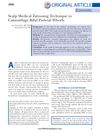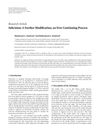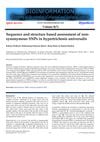Search
for
Sort by
Research
660-690 / 1000+ results
research Scalp Medical Tattooing Technique to Camouflage Bifid Parietal Whorls
Scalp medical tattooing effectively camouflages bifid parietal whorls.

research Update on Hidradenitis Suppurativa (Part I): Epidemiology, Pathogenesis, Severity Assessment and Comorbidities
Hidradenitis suppurativa is a chronic skin condition more common in women, linked to genetics and lifestyle factors, and associated with various other health issues.

research Dermoscopy: Distinguishing Malignant Tumors From Benign
Dermoscopy greatly improves melanoma diagnosis and reduces unneeded surgeries.

research Recent Advances in Genome-Editing Technology with CRISPR/Cas9 Variants and Stimuli-Responsive Targeting Approaches within Tumor Cells: A Future Perspective of Cancer Management
New CRISPR/Cas9 variants and nanotechnology-based delivery methods are improving cancer treatment, but choosing the best variant and overcoming certain limitations remain challenges.

research The Enticing Path of miR Therapeutics: Difficult but Not Without Prospects
Developing microRNA-based treatments is hard but has potential.
research Platelet-Rich Plasma in Dermatology: New Insights on the Cellular Mechanism of Skin Repair and Regeneration
PRP helps skin heal, possibly through special cells called telocytes.

research Obesity in Adults: Position Statement of Various Polish Medical Associations
The conclusion is that obesity should be managed with a slow, balanced approach to diet and exercise, with medication and surgery as additional options, and education and access to care are important.

research Wnt4 Increases the Thickness of the Epidermis in Burn Wounds by Activating Canonical Wnt Signalling and Decreasing Cell Junctions Between Epidermal Cells
Wnt4 protein makes the outer skin layer thicker in burn wounds by turning on a specific healing pathway and loosening the connections between skin cells.

research Wound Healing: A Cellular Perspective
The document concludes that better targeted treatments are needed for wound healing, and single-cell technologies may improve cell-based therapies.

research New Biomarkers to Evaluate Hyperandrogenemic Women and Hypogonadal Men
The document concludes that hormonal biomarkers are key for diagnosing hyperandrogenemia in women and hypogonadism in men.

research Production-Scale Fibronectin Nanofibers Promote Wound Closure and Tissue Repair in a Dermal Mouse Model
Large-scale fibronectin nanofibers help heal wounds and repair tissue in a skin model of a mouse.
research Steroid Responsive Mononeuritis Multiplex in the Cronkhite-Canada Syndrome
Steroid treatment improved both gut and nerve symptoms in a man with Cronkhite–Canada syndrome.

research Ultraviolet-Induced Red Fluorescence in Androgenetic Alopecia Indicating Alterations in Microbial Composition
Red fluorescence in AGA scalps is linked to different microbes.

research Genome-Wide DNA Methylation and Transcriptome Analyses Reveal the Key Gene for Wool Type Variation in Sheep
The SOSTDC1 gene is crucial for determining sheep wool type.

research How Biodegradable Polymers Can Be Effective Drug Delivery Systems for Cannabinoids: Perspectives and Challenges
Biodegradable polymers can improve cannabinoid delivery but need more clinical trials.
research Life Sciences Discovery and Technology Highlights
New findings suggest certain genes and microRNAs are crucial for wound healing, and innovative technologies like smart bandages and apps show promise in improving treatment.
research Gene Therapy to Enhance Angiogenesis in Chronic Wounds
Gene therapy shows promise for healing chronic wounds but needs more research to overcome challenges.

research Subcision: A Further Modification, An Ever Continuing Process
New subcision technique with a bent needle and syringe improves ease, effectiveness, and comfort for treating acne scars.

research Unraveling the Potential of Natural Bioactives in Combating Hair Loss and Scalp Disorders
Natural substances might help with hair loss and scalp problems.
research Capillary Therapy of Male Androgenetic Alopecia with the Use of Low Power Laser Associated with Essential Oils
Low-power laser therapy with essential oils effectively promotes new hair growth in male pattern baldness.

research Survey of the Hair Growth Stimulating Effects of Shampoo Containing Grapefruit Peel and Gleditsia Sinensis Essential Oils on Shaved White Mice
The shampoo with grapefruit peel and Gleditsia sinensis helps mice grow hair faster, more, and longer.
research Solitary Fibrofolliculoma: A Retrospective Case Series Review Over 18 Years
The conclusion is that surgical removal of solitary fibrofolliculoma is effective with no relapses, and diagnosis requires a biopsy due to varied symptoms.

research Overexpression of Alfalfa SIMK Promotes Root Hair Growth, Nodule Clustering, and Shoot Biomass Production
Overexpressing SIMK in alfalfa boosts root hair growth, nodule clustering, and shoot biomass.

research The Proximal Promoter of the Human Transglutaminase 3 Gene
The TGM3 gene's promoter region is key for skin and hair cell function and may aid gene therapy.

research Sequence And Structure Based Assessment Of Non-Synonymous SNPs In Hypertrichosis Universalis
Two specific SNPs in the TRPS1 gene cause excessive hair growth by altering the protein's structure.

research Liquid Chromatography-Mass Spectrometry Applied to the Identification and Quantification of Animal Hair Fibers in Textile Products
Researchers developed a method to identify and measure different animal hair fibers in textiles, successfully distinguishing materials like cashmere from cheaper fibers.

research Advances in Aesthetic Therapies: Platelet-Rich Plasma Procedure for the Treatment of Alopecia
Platelet-rich plasma (PRP) is an effective treatment for hair loss that involves scalp injections and requires ongoing maintenance.

research Comparison of the Efficacy of Two Different Local Anesthesia Techniques for Mesotherapy in Temporal Region Alopecia
Adding a zygomaticotemporal nerve block reduces pain more effectively during hair regrowth treatments.

research A Case of Telogen Effluvium Cured by Individualized Medicine
Individualized homeopathic treatment led to complete hair regrowth in a patient with stress-induced hair loss.